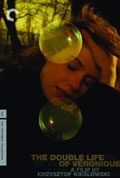
France/Poland/Norway 1993
Directed by
Krzysztof Kieślowski
98 minutes
Rated M
Reviewed by
Bernard Hemingway

The Double Life of Veronique
I must confess that I am not fond of Krzysztof Kieślowski’s films which appear to me as rather self-conscious exercises in the art house manner. That the director established himself in France, the home of stylistic self-consciousness, only tends to support my disaffection. The Double Life of Véronique, scripted by the director and his regular collaborator, Krzysztof Piesiewicz, with its enigmatic story of a winsome singer of choral music who expires on stage and a teacher of music who falls in love with a handsome puppeteer (and vice versa) fairly reeks of artistic hubris and thanks to another regular Kieślowski collaborator, cinematographer Slawomir Idziak, the film looks the part.Irène Jacob plays both Weronika, the Polish singer and Véronique, the French music teacher. Both womn feel that something is out of whack with their lives but neither know what. Weronika happens to see Véronique when the latter is on a holiday bus passing through Kracow. This inkling appears to be enough to soon knock her off her perch, something which Véronique vaguely feels. With Weronika disposed of, the bulk of the film is given over to Véronique and her spiritually-profound love affair with the puppeteer who is also a writer of children’s books and is, of course, happy to endorse that there are more things under heaven and on earth than the eye can see.
But is Kieślowski’s film anything but appearance? Proceedings are beautifully framed and the director contrives to have Ms Jacob, who has the pale beauty of a young Ingrid Bergman or her daughter, Isabella Rossellini, topless or in her lingerie in multiple scenes, making sure that we are lulled into a sensual languor whilst Idziak makes much use of visual distortion, playing with the camera focus and shooting through distorting lens, to suggest the unreliability of appearances. There is however no real resolution to the story and the final scene, which shows Véronique stroking the gnarled bark of a tree and her cabinet-maker father looking up as if he sensed his daughter’s presence, well exemplifies the question of whether the film is a case of poetic insightfulness or woolly pretension. The answer really comes down to the viewer.
Want something different?





